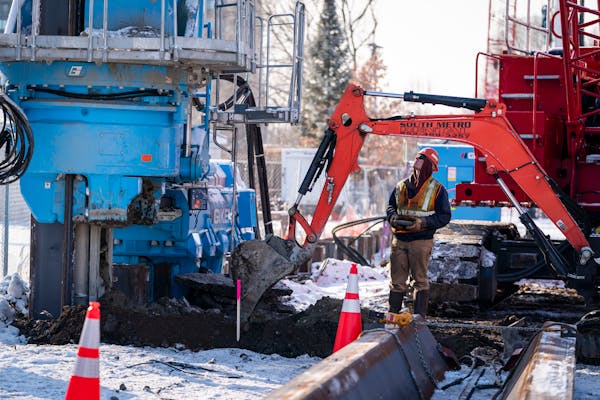A bipartisan coalition of state legislators on Thursday demanded an audit of the Southwest light-rail line project, only a day after officials announced that the largest public infrastructure project in Minnesota history is ballooning in cost and will open four years later than planned.
"Southwest light rail is a boondoggle of historic proportions," said Sen. Scott Newman, R-Hutchinson, in a statement. "Words barely capture what a monumental disaster it has been."
Newman, chair of the Senate Transportation Finance and Policy Committee, said a bill calling for an audit of the line will "receive an early hearing in the Transportation committee this year."
Sen. Scott Dibble, DFL-Minneapolis, said Thursday that he will introduce legislation calling for an inquiry, as well. Dibble, the ranking minority member on the transportation committee, called Southwest's swelling budget and timeline "jaw dropping and appalling, but not surprising."
The full-fledged review would be done by the Legislative Auditor's Office, a process that can take up to a year, though supporters expressed hope it could be expedited. The state watchdog released a limited review of Southwest's operations last fall that was conducted at the behest of Dibble and Rep. Frank Hornstein, DFL-Minneapolis.
Last summer, Dibble and Hornstein asked the legislative auditor for an expedited review of the Southwest project's overall costs, cost overruns, delays and management. The request came after the project tapped into an additional $200 million in contingency funds from Hennepin County.
The 31-page legislative auditor's memorandum probed the deteriorating relationship between the Metropolitan Council, the regional planning body that is building Southwest, and its main architectural and engineering contractor, AECOM Technical Services (ATS).
The memo highlighted "a prolonged and significant difference of opinion" between the Met Council and ATS regarding the preparation of independent cost estimates for change orders on the Southwest project. To date, there have been 445 change orders during construction, totaling $203 million.
"There are some serious problems here and we need to get to the bottom of them," Dibble said in an interview.
The Met Council is now saying that Southwest's price tag will likely wind up between $2.65 billion and $2.75 billion, and that the line probably will not begin service until 2027. At this point last year, Southwest's budget was $2 billion and service was projected to begin in 2023.
Council officials attribute the budget hike and delay to complications with building a tunnel in the narrow Kenilworth Corridor of Minneapolis, the addition of the Eden Prairie Town Center station, and a $93 million crash wall separating freight and light-rail trains west of Target Field.
The council also unanimously approved a $210 million settlement resolving disputes with the project's main construction contractor, Lunda McCrossan Joint Venture. The pact, which is not part of any legal action, is covered by the project's existing budget.
Newman said he supports freezing funding for Southwest until an audit is completed, a call that was also made Thursday by Rep. John Petersburg, R-Waseca.
The state has contributed $30 million toward Southwest's construction, with the federal government and Hennepin County responsible for the bulk of the building costs.
"It is beyond lunacy to consider spending even one more red cent on any more of this nonsense," Newman said.
Said Met Council spokeswoman Terri Dresen: "The Met Council welcomes the opportunity to continue this important discussion."
As controversy continued to build this week about the Southwest project, Gov. Tim Walz announced Wednesday that he was setting aside $200 million in his budget to help fund the Bottineau Blue Line light-rail project. It would extend the existing Blue Line from downtown Minneapolis northward to Brooklyn Park.
The original route for the Bottineau project was scrapped by the Met Council in 2020 after years of negotiations with BNSF Railway failed to reach an agreement to share much of the route with freight trains. The Met Council is now seeking public input on possible routes for the line.
In heated western Minn. GOP congressional primary, outsiders challenging incumbent

Minnesota Sports Hall of Fame: A class-by-class list of all members

This retired journalist changed professional wrestling from Mankato

